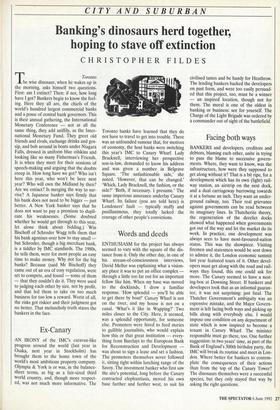Facing both ways
BANKERS and developers, creditors and debtors, blaming each other, unite in trying to pass the blame to successive govern- ments. Where, they want to know, was the infrastructure, how were they supposed to get along without it? That is a bit ripe, for a development which has its own (light) rail- way station, an airstrip on the next dock, and a dual carriageway burrowing towards it at a fortune an inch. They want an under- ground railway, too. Their real grievance against governments can be read between its imaginary lines. In Thatcherite theory, the regeneration of the derelict docks showed what happened when governments got out of the way and let the market do its work. In practice, one development was always seen to have most-favoured-nation status. This was the showpiece. Visiting firemen and statesmen would be sent down to admire it, the London economic summit last year featured tours of it. Other devel- opers must get along with the road and rail- ways they found, this one could ask for more. The Canary seemed to have a nest- ing-box at Downing Street. If bankers and developers took that as an informal guaran- tee, it was not surprising: just fatal. The Thatcher Government's ambiguity was an expensive mistake, and the Major Govern- ment is left facing both ways and picking up bills along with everybody else. I would impose one condition on any department of state which is now inspired to become a tenant in Canary Wharf. The minister responsible must go there, too. One further suggestion: in two years' time, as part of the Bank of England's 300th birthday party, the IMC will break its routine and meet in Lon- don. Where better for bankers to contem- plate the consequences of their actions than from the top of the Canary Tower? The dinosaurs themselves were a successful species, but they only stayed that way by asking the right questions.


































































 Previous page
Previous page